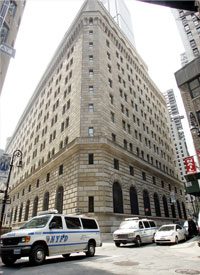
The U.S. central bank has once again refused to open itself up to even the slightest amount of transparency. According to Bloomberg news, the Federal Reserve (Fed) Board of Governors is essentially snubbing a request by the Treasury Department for a public review of its structure and governance, even though the review was supposed to be led by the Fed itself.
Ironically, since the Obama administration is proposing broad new powers for the secretive institution, the Fed was supposed to prepare a "comprehensive review" to determine its "ability to accomplish its existing and proposed functions." The study was also supposed to focus on the role of regional Fed banks. But it was not to be.
"Some top central bank officials, after agreeing to the review, saw a potential threat to Fed independence after the Treasury released the proposal," Bloomberg reported, citing unnamed sources in an article entitled "Fed Rejects Geithner Request for Study on Governance, Structure." Treasury Secretary Timothy Geithner is himself a former Fed banker.
But while the preparation of the report has not been officially rejected yet, it was supposed to be due on October 1, and so far no work whatsoever has even begun, the article noted. The bank is instead undertaking its own "internal" study led by Fed Governor Elizabeth Duke.
"The institution is trying to keep a low profile," explained Vincent Reinhart, a resident scholar at the American Enterprise Institute and the former director of the Fed boardís Division of Monetary Affairs, who was quoted in the news story. "To publish a report now invites comment on that report."
Other analysts cited in the Bloomberg article said this sort of review of the role of directors was long overdue. "Allowing local bankers to play a leading role in selecting reserve bank presidents is the most worrying aspect of the current system," said Lou Crandall, the chief economist at Wrightson ICAP. "The conflicts of interest inherent in the current system are glaring."
But this is far from the first time the Fed has shunned transparency. The central bank recently won a stay on a court order that would force it to disclose the recipients of trillions in secret "emergency" loans. It is preparing to appeal the decision, arguing that divulging such information could put the companies at risk and hurt the economy. This despite the fact that it does not even legitimately possess the authority to engage in such bailouts.
The Federal Reserve Bank of New York (FRBNY) argued in a supplemental brief for the case that it was not obligated to disclose information under the Freedom of Information Act because it was not part of the government. "The FRBNY is not an establishment of the executive branch because it is a corporation whose stock is privately held," explained the brief, also noting that it "is overseen by a board of directors the majority of whom are privately appointed" and that "none of the stock of the FRBNY is government-owned."
The Fed is also facing scrutiny from Congress, as Representative Ron Paul’s bill to audit the bank for the first time recently obtained sponsorship from more than two-thirds of the House — a veto-proof majority. Its companion bill in the Senate is making progress as well, with over a quarter of that body signed on already. A recent poll revealed that 75 percent of Americans support the audit.
"The more the Federal Reserve digs in and resists or rejects all attempts at reviews, the more damning the idea becomes that they have something to hide," charged an editorial in American Banking News entitled "Federal Reserve Out of Control — Rejects Another Public Review." "When you consider the sole argument against all of this is the ‘independence’ of the central bank, you realize it’s operating above and beyond what even the government of America is, as the three branches of the government were set up for the very purpose of checks and balances so no one of them could do what it is the Federal Reserve is attempting to do: whatever they feel like doing." The piece suggested the Fed was close to "going renegade" and that it was exercising illegitimate powers.
The unconstitutional central bank is openly flaunting the system even as it continues to inflate the money supply and bail out special interests. For it to openly engage in this sort of behavior is an insult to every American. Spokesmen for both the Fed and the Treasury declined to comment, but there is a solution: audit and then disband the unconstitutional fiat money monopoly and restore a constitutional monetary system based on the principles of a sound currency and the rule of law.
— Photo: AP Images



